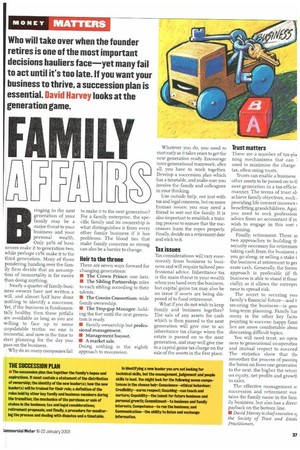FA
Page 37

If you've noticed an error in this article please click here to report it so we can fix it.
ringing in the next generation of your family may be a major threat to your business and your personal wealth. Only 30% of businesses make it to generation two, while perhaps io% make it to the third generation. Many of those pondering handing over the family firm decide that an assumption of immortality is far easier than doing anything.
Nearly a quarter of family-business owners have not written a will, and almost half have done nothing to identify a successor. Yet, if the business is fundamentally healthy, then these pitfalls are avoidable as long as you are willing to face up to some unpalatable truths: no one is immortal, and now is the time to start planning for the day you pass on the business.
Why do so many companies fail
to make it to the next generation? For a family enterprise, the specific family and its ownership is what distinguishes it from every other family business if it has problems. The blood ties that make family concerns so strong can also be a barrier to change.
Heir to the throne There are seven ways forward for changing generations: • The Crown Prince: one heir.
• The Sibling Partnership: roles to each sibling according to their talents.
• The Cousin Consortium: wide family ownership.
• The Stop-gap Manager: holding the fort until the next generation is ready.
• Family ownership but professional management.
• Management buyout.
• A market sale.
Doing nothing is the eighth approach to succession.
Whatever you do, you need to start early as it takes years to get the next generation ready. Encourage inter-generational teamwork; after all, you have to work together. Develop a succession plan which has a timetable, and make sure you involve the family and colleagues in your thinking.
Use outside help, not just with tax and legal concerns, but on more human issues: you may need a friend to sort out the family. It is also important to establish a training process to ensure that the successors learn the ropes properly. Finally, decide on a retirement date and stick to it.
Tax issues Tax considerations will vary enormously from business to business and will require tailored professional advice. Inheritance tax is the main threat to your wealth when you hand over the business, but capital gains tax may also be an issue if assets are being disposed of to fund retirement.
What if you do not wish to keep family and business together? The sale of any assets for cash which is then passed to the next generation will give rise to an inheritance tax charge when the estate is passed on to the next generation, and may well give rise to a capital gains tax charge on the sale of the assets in the first place. Trust matters There are a number of tax-pla ning mechanisms that can I used to minimise the charge tax, often using trusts.
Trusts can enable a business other assets to be passed on to ti next generation in a tax-efficie: manner. The terms of trust al; achieve family objectives, such , providing life interest incomes 1 benefitting grandchildren. Agai you need to seek profession advice from an accountant dye wish to engage in this sort planning.
Finally, retirement. There ai two approaches to building th security necessary for retiremen taking cash from the business you go along, or selling a stake i the business at retirement to ger erate cash. Generally, the forme approach is preferable (if th business is able to stand it finar cially) as it allows the entrepri neur to spread risk.
The secret to securing you family's financial future—and t securing the business—is goo. long-term planning. Family hai mony is the other key facto pointing to success: happy fami lies are more comfortable abou discussing difficult topics.
You will need trust, an open ness to generational co-operatioi and mutual respect to succeed The statistics show that thi smoother the process of passini the baton on from one generatior to the next, the higher the returr on equity, net profits and growft in sales.
The effective management a succession and retirement sus tains the family name in the fam ily business, but also has a direci payback on the bottom line.
• David Harvey is chief executive rr, the Society of Trust and Estatr Practitioners.




























































































































































